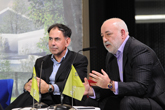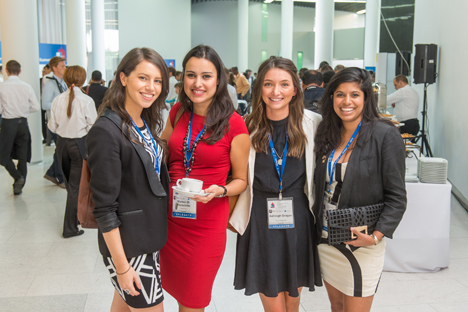Russian entrepreneurs get boost from Skolkovo initiative
Russians and foreigners looking to launch new ventures stand to gain from a recent initiative of Moscow’s Skolkovo Innovation Centre to provide a platform at its ‘Start-up Village’ for potential investors and entrepreneurs.
More than 10,000 people participated in the two-day event, on June 2 and 3, indicating unprecedented enthusiasm for the move. Among those who attended were Russian and foreign entrepreneurs, investors, venture fund representatives and government officials.
The event was an unprecedented one in Russia, where an environment for innovation only began developing a few years ago. The event at the Start-up Village was the grand finale of a year-long ‘Start-up’ road show by Russian development institutions which have, throughout the year, been looking for the best innovation ideas in 12 Russian cities.
"The start-up environment has just begun in Russia; we are witnessing its birth," said Alexei Sitnikov, Vice president of the Skolkovo Institute of Science and Technology (Skoltech), a joint venture between the Skolkovo Foundation and MIT.
Related:

Skolkovo institute loses set funding from state-owned firms
Skoltech held its first graduation ceremony in 2015, during the Start-up Village event. More than 70 percent of Skoltech’s students have set up their own companies during the duration of their studies.
"What makes a startup land in Russia?"
Experts at the Startup Village recommended that companies think "globally," and not orient themselves exclusively towards import substitution. Skolkovo Foundation's Vice President Vasily Belov stated that 89 Skolkovo resident-companies currently sell their products abroad.
"Just a few years ago Russia did not have a startup environment or infrastructure for their development," claimed Sitnikov. "Often the technologies that Russian companies offer are the best of their kind. The only question is whether or not they can be commercialized abroad."
Today Russian startup companies have an enormous selection of platforms for their development. At the Startup Village techno park representatives from Spain, Turkey, Singapore, Japan, the U.S. and many other countries spoke about their opportunities. Before entering foreign markets "it is important to get a strong foundation in your own country," said Susanne Burkeholder, director of the Huston Technology Center, one of Skolkovo's partners.
"What makes a startup land in Russia?" Burkeholder remarks. "It is the support system, which Skolkovo definitely has. The innovation center's collaborators have a very high level of competency. Something unique is developing here. Therefore Russia is an excellent place to establish a company."
In search of investors and partners
Over 1,000 investors from across the world registered for the meet at the Start-up Village. 14 agreements were signed on the first day, with only the major ones valued at a total of 13 billion rubles. These included start-ups with tie-ups with giants like Alibaba Express and Panasonic. Smaller deals took place on the sidelines, some even during their pitch sessions.
"Do you understand that to test your antitumor apparatus and then try to enter a market, you will need to invest much, much more?" a jury member asked a representative of a regional startup that presented their idea at the Biomed competition. There were some questions from the audience. Then an intellectual property consultant from a large Korean company stood up and asked: "How much do you need for your development?" The representative said $10,000. It was in such an informal atmosphere that potential deals were hashed out.
Approximately 350 teams participated in a competition to attract investments for their projects. A total of 26 startups made it to the final round and there were three winners. The Graviton project won first place, which offers sensors for security systems. The Tektum project came in second place, a product offering a hemostatic device. The bronze medal was given to RealTarget, a new immunotherapy method for treating oncological disease.
Is technology outside the realm of politics?
Economic sanctions imposed by the West on Russia, and the uncertain political atmosphere because of these sanctions are the main obstacle for Russian start-ups today. According to a Finnish participant, many Finnish companies that were interested in Russian start-ups and wanted to enter the Russian market had to postpone their expansion. The 40 foreign diplomats visiting Start-up Village all appeared to agree that technology should stay “outside of politics."
American Ambassador John Tefft reminded everyone that half a dozen of large American companies, including Microsoft, IBM and Boeing, are among the innovation center's partners. French Ambassador to Russia Jean-Maurice Ripert, who was clearly disappointed by the absence of French cheese at the food court, talked about the participation of French architects in the creation of Skolkovo's architectural image.
"We like to do business with people here," said Burkeholder. "I think that bilateral relations are happening here. They happen between companies, they happen between people. There are some things to overcome, but I think we’ll just keep moving forward."
All rights reserved by Rossiyskaya Gazeta.
Subscribe
to our newsletter!
Get the week's best stories straight to your inbox
